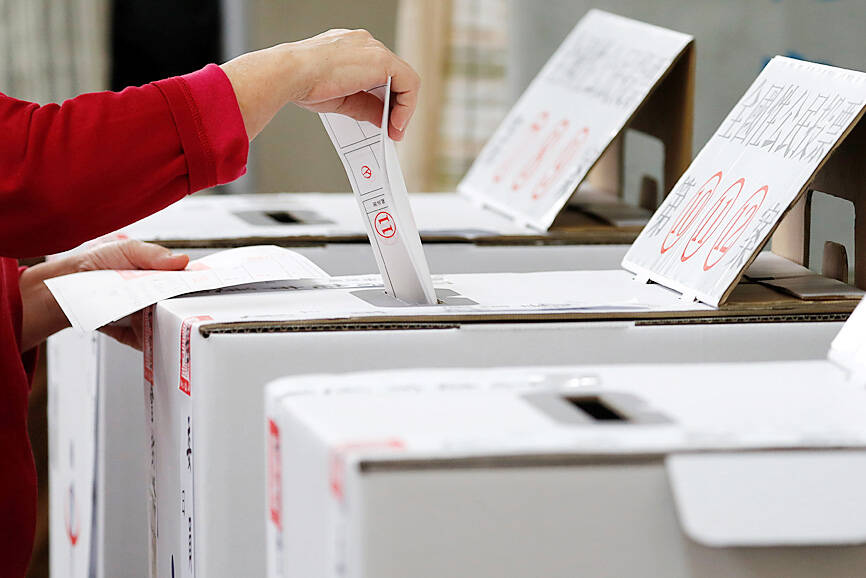The government is open to discussions about implementing domestic transfer voting, a type of absentee voting, in national elections and referendums, but electronic voting by Taiwanese expatriates living overseas is “absolutely unfeasible,” Premier Cho Jung-tai (卓榮泰) told lawmakers in a plenary session yesterday.
Democratic Progressive Party (DPP) Legislator Lin I-chin (林宜瑾) said that the Taiwan People’s Party (TPP) caucus last week had proposed a referendum on whether “transfer voting” should be allowed in referendums and elections at all levels, but it failed to offer clear definitions of “absentee voting” and “transfer voting.”
Lin questioned whether it would be feasible for the government to allow electronic voting or establish overseas polling stations, given China’s attempt to undermine democracy in Taiwan.

Photo: Tyrone Siu, Reuters
In response, Cho said that the government “would neither consider, nor accept electronic voting for overseas voters at this time,” citing the potential for manipulation by hostile regimes and the serious risks such interference could pose to Taiwan’s democratic system.
Whether transfer voting should be permitted in elections remains open for public discussion, he said, adding that such a system should be limited to national elections, excluding local races.
Domestic transfer voting is a system that would allow voters who work in northern Taiwan, but have residences registered in other parts of the nation, to cast ballots at polling stations nearby, even if their household registrations are in other regions.
Domestic transfer voting could initially be tested in referendums on specific issues, but the system for elections for public office would be significantly more complex and face “great difficulties,” he added.
Central Election Commission (CEC) Chairman Lee Chin-yung (李進勇) told lawmakers that the commission and the Ministry of the Interior have consistently held that absentee voting involves many complicated factors, and if not carefully implemented, could disrupt the stability of the electoral process.
“We prefer to adopt a steady approach by trying absentee voting on issue referendums first before using it in elections of public officials,” Lee said. “Further discussions are needed on how both situations should proceed.”
TPP Legislator Lin Kuo-cheng (林國成) on the sidelines of the legislative plenary session said that his party’s proposal pertains to domestic transfer voting.
It does not apply to those residing in China or other nations, nor is it related to overseas electronic voting, he said.
In the referendum proposed by the TPP, voters would be asked whether they agree that the government should establish legal procedures within two years before implementing transfer voting in referendums and elections of all levels within the country, based on the bill that the party proposed last week.
Despite opposition from DPP lawmakers, the TPP worked with Chinese Nationalist Party (KMT) legislators to pass the bill through its preliminary reading.
Legislative Speaker Han Kuo-yu (韓國瑜) ruled that the bill would advance to a second reading and undergo further negotiations among caucuses.
Absentee voting can take several forms, including mail-in voting, proxy voting, early voting, transfer voting or allowing absentees to cast ballots at designated polling stations.
Under the transfer voting model, voters who are unable to return to their registered residence on election day would be allowed to vote at a precinct near their place of residence, provided they apply in advance within a specified period.

A small number of Taiwanese this year lost their citizenship rights after traveling in China and obtaining a one-time Chinese passport to cross the border into Russia, a source said today. The people signed up through Chinese travel agencies for tours of neighboring Russia with companies claiming they could obtain Russian visas and fast-track border clearance, the source said on condition of anonymity. The travelers were actually issued one-time-use Chinese passports, they said. Taiwanese are prohibited from holding a Chinese passport or household registration. If found to have a Chinese ID, they may lose their resident status under Article 9-1

Taiwanese were praised for their composure after a video filmed by Taiwanese tourists capturing the moment a magnitude 7.5 earthquake struck Japan’s Aomori Prefecture went viral on social media. The video shows a hotel room shaking violently amid Monday’s quake, with objects falling to the ground. Two Taiwanese began filming with their mobile phones, while two others held the sides of a TV to prevent it from falling. When the shaking stopped, the pair calmly took down the TV and laid it flat on a tatami mat, the video shows. The video also captured the group talking about the safety of their companions bathing

A classified Pentagon-produced, multiyear assessment — the Overmatch brief — highlighted unreported Chinese capabilities to destroy US military assets and identified US supply chain choke points, painting a disturbing picture of waning US military might, a New York Times editorial published on Monday said. US Secretary of Defense Pete Hegseth’s comments in November last year that “we lose every time” in Pentagon-conducted war games pitting the US against China further highlighted the uncertainty about the US’ capability to intervene in the event of a Chinese invasion of Taiwan. “It shows the Pentagon’s overreliance on expensive, vulnerable weapons as adversaries field cheap, technologically

Starting on Jan. 1, YouBike riders must have insurance to use the service, and a six-month trial of NT$5 coupons under certain conditions would be implemented to balance bike shortages, a joint statement from transportation departments across Taipei, New Taipei City and Taoyuan announced yesterday. The rental bike system operator said that coupons would be offered to riders to rent bikes from full stations, for riders who take out an electric-assisted bike from a full station, and for riders who return a bike to an empty station. All riders with YouBike accounts are automatically eligible for the program, and each membership account